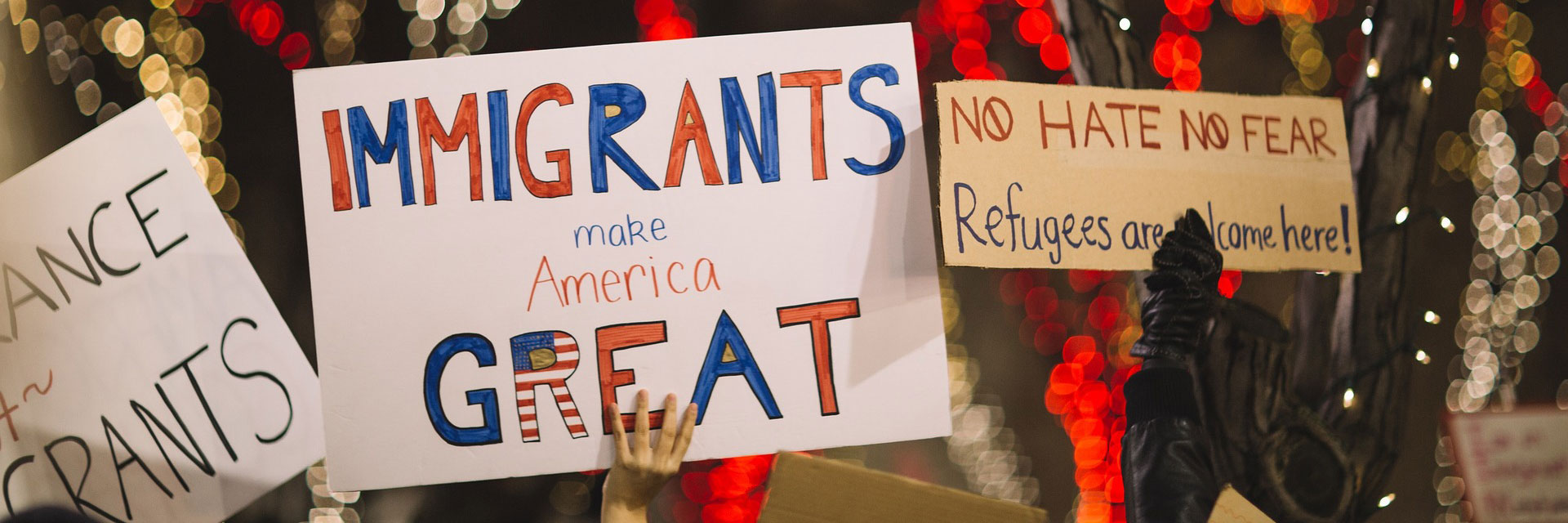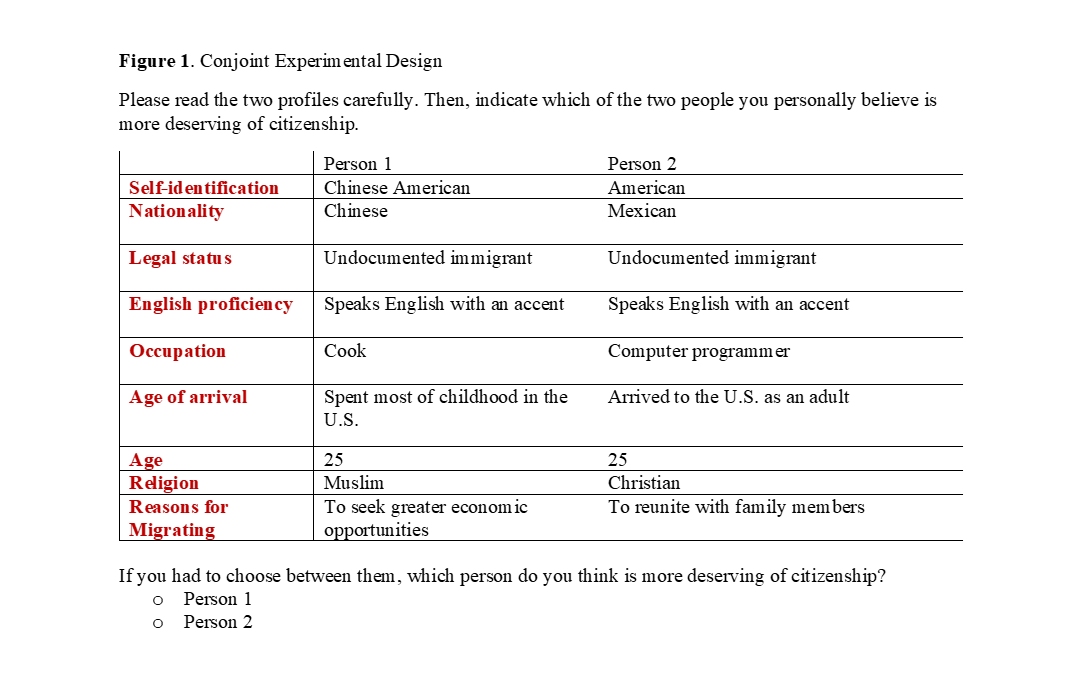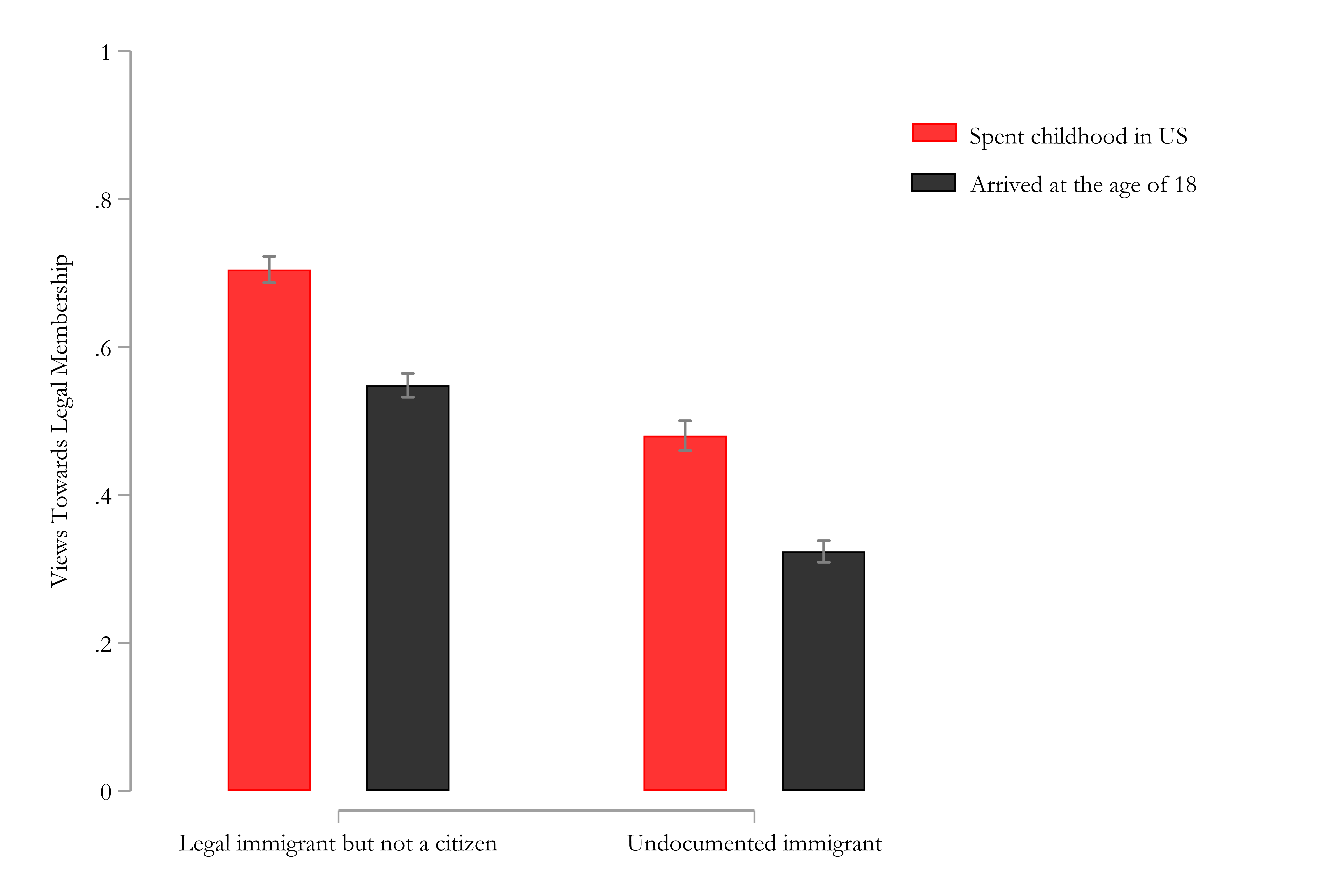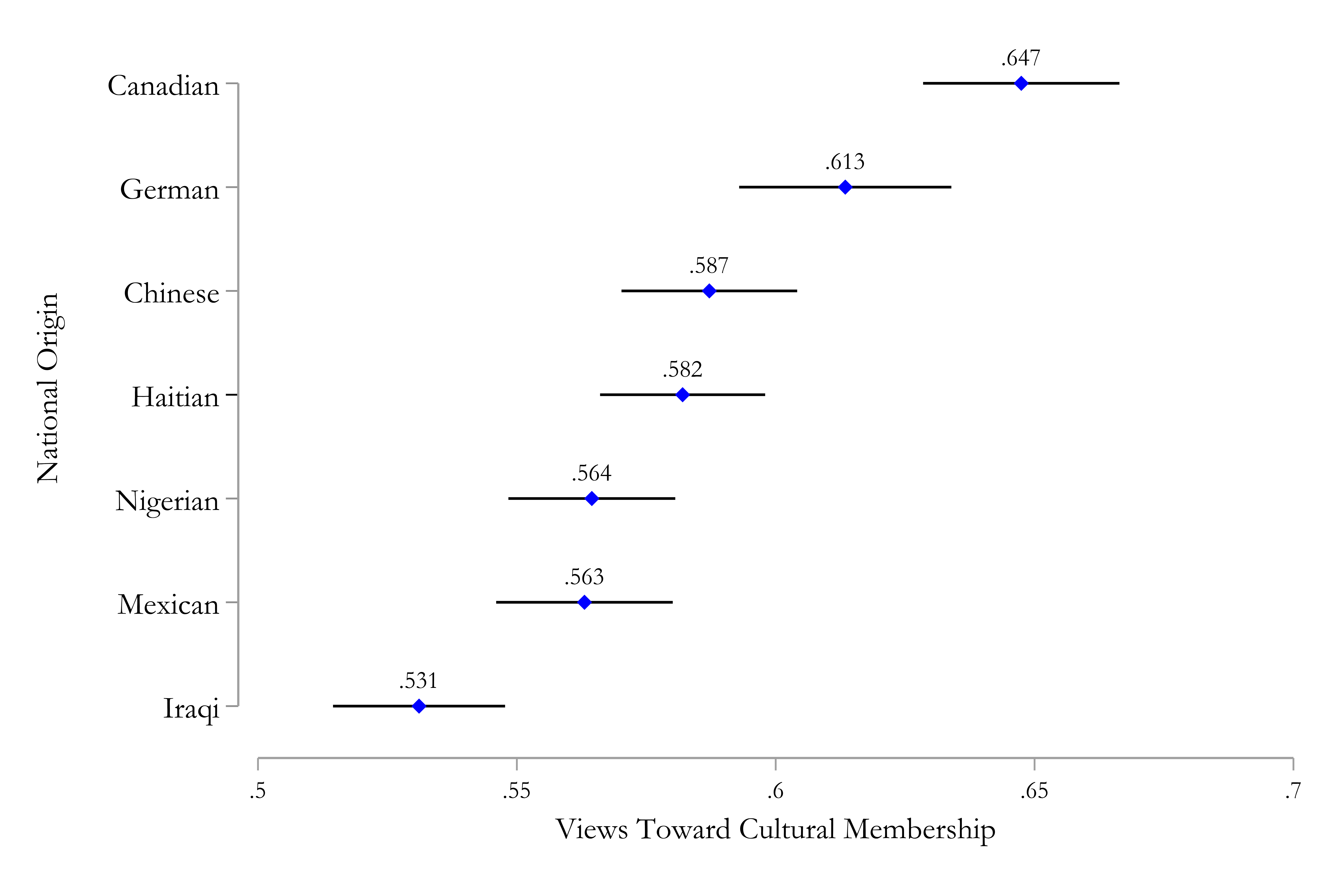Citizenship and national belonging are topics that any modern state and society must address. In the U.S., proposals to eliminate birthright citizenship from the Constitution, a contentious battle over whether to add a citizenship question to the Census, and new restrictions on immigration are the most recent examples that forefront these topics to the public. In an ongoing project, my collaborator Denise Ambriz and I study how people evaluate issues related to immigration and citizenship in contemporary societies. We distinguish between legal membership (a citizen of the state) and cultural membership (i.e., who is considered a fellow American).
What Makes a Citizen?

Key Findings
- We find that immigrants who have documented status, arrived in the US as children, and escaped religious persecution or violence are more likely to be perceived as deserving of a pathway to legal membership.
- Race and ethnicity remain a significant factor for who is considered an American.
- The results also highlight how US-born Whites and racial minority groups (Black and Latinx) evaluate legal and cultural membership differently.
Why Citizenship Matters
At its most basic, citizenship represents formal status that defines who has access to political, economic and social rights.1,2 Thus, one line of research examines how acquiring legal status translates into both objective benefits for immigrants.3 In contrast, scholarship that examines group membership and national identity argues that access to status and rights is a necessary, but insufficient condition for people to enjoy full membership in the polity.4 Through in-depth interviews with immigrants, these studies provide important insights regarding why citizenship matters beyond formal state actions5. Critically though, this work does not capture the other side of the equation—the perspective of citizens themselves. In this project, we ask: 1) Which characteristics are most salient for US-born Americans when evaluating legal and cultural membership? and 2) Do White US-born Americans hold distinct views toward citizenship?
Findings
To answer these questions, we conducted a conjoint survey experiment that oversampled Black and Latinx respondents. Respondents were presented with the profiles of hypothetical immigrants, and based on the information included in the profiles (e.g., legal status, nationality, English proficiency) respondents then answered a set of questions related to various social issues—in this case, views regarding national belonging (see Figure 1). A key advantage of this experimental design is that it limits social desirability, a type of bias in which respondents give answers that make them look favorable. Additionally, the design allows us to examine if and how much each immigrant attribute matters for legal and cultural membership.

We find that US-born Americans evaluate legal and cultural membership in distinct ways. Legal status is the most significant characteristic when evaluating legal membership: undocumented immigrants are about 23 percentage points less likely than documented immigrants to be deemed worthy of citizenship, net of other factors. (Note: These factors include nationality, reasons for migrating, age of arrival, English proficiency, age, religion, self-identification, and occupation.) However, sentiments towards undocumented immigrants are quite nuanced once we account for age of arrival and reasons for migrating. For instance, undocumented immigrants who spent most of their childhood in the U.S. are around 17 percentage points more likely to be perceived as deserving of legal membership compared to those who arrived later in life (see Figure 2). Additionally, immigrants who come to the U.S. to escape religious persecution and violence in their home-country are more likely to be perceived as deserving of legal membership than those who come here for economic reasons.

In stark contrast to legal membership, race and ethnicity still shapes attitudes toward cultural membership, or who is considered an American. To put this in context, Figure 3 shows the predicted probabilities of immigrants being perceived as American, by national origin. White immigrant groups (Canadian and German) have the greatest probability of being perceived as a fellow American—even after considering legal status.
Lastly, the results highlight how US-born Whites and racial minority groups (Black, Latinx) define the boundaries of legal and cultural membership differently, due to competing visions of national belonging. For instance, the penalty for undocumented status is about 10 percentage points higher among White respondents than Black respondents and 13 percentage points higher than Latinx respondents. Additionally, nationality only matters for White respondents when evaluating cultural membership compared to Black and Latinx respondents. In generally, we find that Black and Latinx respondents have a more inclusive definition of both legal and cultural membership compared to White respondents.

Conclusion
Arguably, at the heart of immigration and citizenship questions are issues related to group membership, boundaries, and social belonging. These findings speak to the important link (or lack thereof) between policies and public opinion. Additionally, past research acknowledges that legal inclusion is not the same as cultural membership, yet scholars often conflate these two dimensions. In other words, questions around who is a citizen differs from questions about who is considered American.6 We argue that a one-dimensional approach, at best, provides an incomplete picture of citizenry and at worst, can lead to distorted conclusions about belonging and membership in contemporary societies.
References
- Bloemraad, I., Korteweg, A., & Yurdakul, G. (2008). Citizenship and immigration: Multiculturalism, assimilation, and challenges to the nation-state. Annual review of sociology, 34.
- Vink, M. P., & Bauböck, R. (2013). Citizenship configurations: Analysing the multiple purposes of citizenship regimes in Europe. Comparative European Politics, 11(5), 621-648.
- Catron, P. (2019). The citizenship advantage: Immigrant socioeconomic attainment in the age of mass migration. American Journal of Sociology, 124(4), 999-1042.
- Glenn, E. N. (2011). Constructing citizenship: Exclusion, subordination, and resistance. American sociological review, 76(1), 1-24.
- Beaman, J. (2016). Citizenship as cultural: Towards a theory of cultural citizenship. Sociology Compass, 10(10), 849-857.
- Bonikowski, B., & DiMaggio, P. (2016). Varieties of American popular nationalism. American Sociological Review, 81(5), 949-980.
Meet the Researcher
Muna Adem is a Ph.D. candidate in the Sociology program. She earned her MS in Applied Statistics in 2019. Broadly, her research examines how immigration reshapes group boundaries and the consequences of these boundaries for social cohesion. In particular, she is interested in the mechanisms that facilitate or hinder trust, solidarity, and cooperation across ethno-racial groups in the U.S. and Europe.


